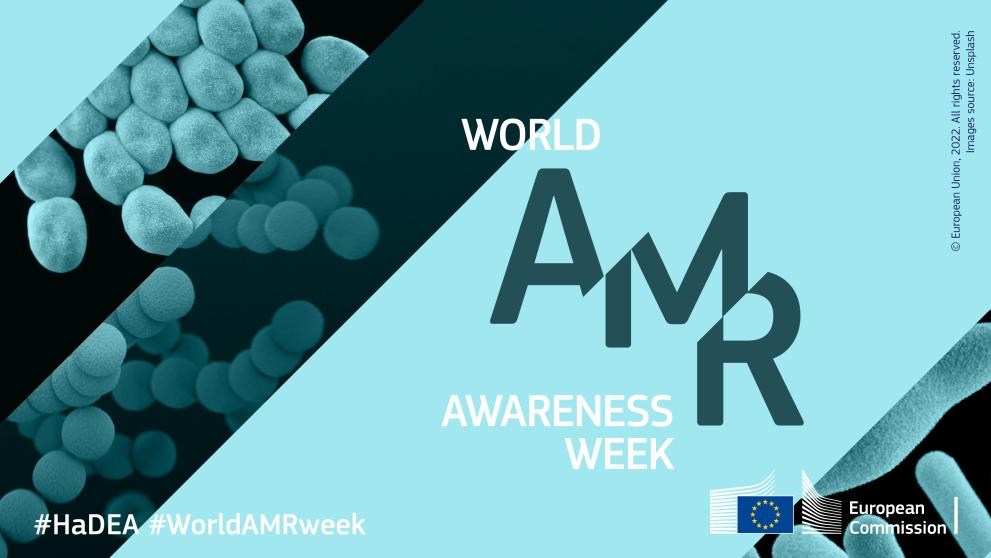
Antimicrobial resistance (AMR) is linked to the excessive and inappropriate use of antimicrobials in animal and human healthcare and accounts for an estimated 33 000 human deaths in the EU/EEA every year.
Statistics show that 75% of recently emerging infectious diseases that affect humans are of animal origin. The EU’s ‘One Health Approach’ recognises the importance of acknowledging the interdependencies between human, animal, plant and environmental health to prevent, detect and respond to future health threats in the EU, including AMR.
HaDEA manages several projects and initiatives contributing to the fight against antimicrobial resistance.
Third EU health programme
Under the Joint Action EU-JAMRAI, EU countries and international organisations, including the European Centre for Disease prevention and Control (ECDC), the Organisation for Economic Co-operation and Development (OECD) and the World Health Organisation (WHO), have joined forces to define European common policies in fighting AMR and controlling healthcare-associated infections (HCAI). EU-JAMRAI has developed best practices and guidelines for better use of antimicrobials at national level. The action will continue under the EU4Health programme as EU-JAMRAI 2, aiming to implement One Health national strategies for AMR and HCAI prevention policies.
The direct agreement between HADEA and the OECD on AMR has helped to define a modelling approach to appropriately replicate AMR transmission dynamics. This approach has allowed to detect phenomena resulting from interactions between humans and their environments and, subsequently, their economic impacts, resulting in the OECD Strategic Public Health Planning for AMR(OECD SPHeP-AMR) model.
EU4Health programme
The HAPPY PATIENT project focuses on addressing the misuse of antibiotics in common community-acquired infections, such as respiratory tract infections, urinary tract infections, and dental infections. In line with the EU guidelines for prudent antimicrobial use in human health, the project aims to reduce inappropriate antibiotic prescriptions by 40%, contributing to the fight against antibiotic resistance in EU countries.
IMAGINE tackles antimicrobial resistance driven by excessive and inappropriate use of antibiotics, particularly among vulnerable older individuals in nursing homes. The project aims to prevent infections, focusing primarily on urinary tract infections. It operates in collaboration with healthcare professionals, including nurses, healthcare assistants, and doctors responsible for diagnostics and antibiotic prescriptions.
The DRIVE-AMS project aims to combat AMR by effectively implementing Antimicrobial Stewardship (AMS) interventions, a recognised step towards improving antimicrobial use, using a behaviour change approach. DRIVE-AMS combines three key elements of measurement, training, and implementation into a comprehensive course. The course is set to help build the capacity of national experts and provide them with personalised AMS interventions.
Involving teams from Southern European countries, where the rates of AMR are particularly high, the TEAM-COACH project aims to create an innovative electronic tool to promote infection prevention and control (IPC) and antimicrobial stewardship (AMS) in paediatrics. This new tool addresses gaps in other existing tools and offers flexible trainings for healthcare workers in both hospital and primary care settings. The project also encourages cross-border collaboration and innovation in the EU.
To support the implementation of the EU One Health Action Plan against AMR, a study has been carried out focusing on identifying the existing barriers to the development and roll-out of the aforementioned plan at national levels. It has also analysed the obstacles that hinder the implementation of effective infection prevention and control measures in Europe.
EU Single Market Programme
To support the Farm to Fork Strategy and to ensure efficient implementation on the ground of the new measures to fight AMR, an initiative has been launched, with the objective of providing training to farmers and veterinarians working with food-producing animals.
Horizon 2020
The Joint Programming Initiative on Antimicrobial Resistance (JPIAMR) is a global collaborative organisation that supports research and innovation projects working to find new treatments, solutions and methods to curb AMR with a One Health approach.
Background
EU4Health is the fourth and largest of the EU health programmes. The programme provides funding to national authorities, health organisations and other bodies through grants and public procurement, contributing to a healthier Europe.
HaDEA manages the vast majority of the total EU4Health budget and implements the programme by managing calls for proposals and tenders from 2021 to 2027.
The EU Single Market Programme brings together the Union actions in the fields of competitiveness of enterprises, especially SMEs, consumer protection, customers and end-users in financial services, policymaking in financial services and in the plant, animal, food and feed areas.
Horizon Europe is the research and innovation programme of the EU for the period 2021-2027. The aims of Cluster 1 ‘Health’ include improving and protecting the health and well-being of citizens of all ages by generating new knowledge, developing innovative solutions and integrating where relevant a gender perspective to prevent, diagnose, monitor, treat and cure diseases. Horizon 2020 (H2020) was the EU’s multiannual funding programme between 2014 and 2020.
Details
- Publication date
- 17 November 2023
- Author
- European Health and Digital Executive Agency
- Programme Sector
- Health
- Food
- Programme
- EU4Health
- Horizon Europe
- Horizon Europe Cluster 1: Health
- Single Market Programme Food Chain
- Tags
- EU financing
- EUFunded
- Food safety
- Medical research
- Public health
